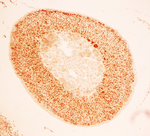Clock-to-Clock Communication
The SCN regulates central and periphery clocks by neuronal and humoral mechanisms. Via this clock-to-clock communication various physiological rhythms are coordinated with each other and synchronized to external time. We are interested in the mechanisms by which central and peripheral clocks are reset. Using surgical and genetic approaches we could show that clocks located in the adrenal cortex are reset via the autonomic nervous system and regulate glucocorticoid release into the blood. The adrenal clock controls the sensitivity of the steroidogenic machinery to endocrine signals form the pituitary. Microarray analyses have shown that more than 3,000 genes are clock regulated in the adrenal, many of which are involved in steroid biosynthesis. Disruption of clock rhythms damages this network, altering glucocorticoid levels in the blood. Glucocorticoids further play a role in transmitting time-of-day information to other peripheral organs. In this context we were able to show that adrenal glucocorticoid rhythms can be pharmacologically manipulated to speed up the adaptation of the circadian system during jet lag.
Ongoing projects:
- The role of the SCN pacemaker in peripheral molecular rhythms.
- Sleep (or lack thereof) as an internal zeitgeber for peripheral clocks.
Selected References:
- Time-of-day dependent adaptation of the HPA axis to predictable social defeat stress. Koch C, Bartlang MS, Kiehn JT, Lucke L, Naujokat N, Helfrich-Förster C, Reber SO, Oster H. J Endocrinol. 2016 Sep 22.
- Impaired glucocorticoid production and response to stress in Arntl-deficient male mice. Leliavski A, Shostak A, Husse J, Oster H. Endocrinology. 2014 Jan;155(1):133-42.
- Circadian regulation of lipid mobilization in white adipose tissues. Shostak A, Meyer-Kovac J, Oster H. Diabetes. 2013 Jul;62(7):2195-203.
- Adrenal glucocorticoids have a key role in circadian resynchronization in a mouse model of jet lag. Kiessling S, Eichele G, Oster H. J Clin Invest. 2010 Jul;120(7):2600-9.
- The circadian rhythm of glucocorticoids is regulated by a gating mechanism residing in the adrenal cortical clock. Oster H, Damerow S, Kiessling S, Jakubcakova V, Abraham D, Tian J, Hoffmann MW, Eichele G. Cell Metab. 2006 Aug;4(2):163-73.

- Research
- Clock Synchronisation
- Clock-to-Clock Communication
- Clocks, Sleep and Metabolism









